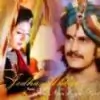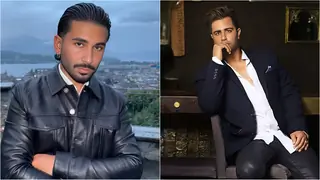Friends, let me start my analysis today by saying that this whole episode yesterday was one big symbolism. On the surface it was how Jodha and Jalal set off on a journey through their kindgom by foot, going ostensibly to the dargah to fulfil the prayers prayed during Jodha's illness, but at the same time also growing closer to each other and to their own people in the process. But how many of you caught the inner symbolism of this whole trip? Here are some of my pointers as to why this trip is such a turning point in their relationship:
THE SYMBOLISM OF THE TRIP ITSELF:
There were three types of symbolism that I could find connected to their taking their trip at all in the first place. Here they are:
Their new personas enable them to see themselves through new eyes:
Jodha and Jalal have assumed alter-personalities of the Seth and the Sethani. So in a symbolic way they have shed their old personas to become two different people entirely and they are now viewing each other and the world with entirely new eyes. Sometimes when we have been used to a blinkered vision of the world, we get so much into a rut with our thinking that unless we see the world as "others see it" we cannot escape the limits of our own thinking.
By being someone else for the duration of this trip, Jodha and Jalal have thus voluntarily given up their thinking ruts in favour of gaining more perspective on themselves and the world they rule and inhabit. In the process they may even feel feelings they never let themselves feel before and they may even learn to express these feelings with the freedom that their new personas give them - something their rigid exalted roles as Jalal the King and Jodha the Queen never allowed them to do.
Haven't we heard of actors saying they love expressing themselves via so many different roles that their own lives have widened and changed as a result. That's what may happen to Jodha and Jalal as they do this new role playing!
With the change in personas they have also shed their fine clothes for simple garb and reduced much of their jewelry. Back to basics seems to be the state of their relationship also. There is again another spoiler that shows Jodha may be forced to give up even the few gold banglles and chains she is wearing to pay the yatri tax and she then starts wearing glass bangles. That symbolises a further erosion of the roles of power they previously thought of themselves as having, to find themselves as simpler but more fundamentally strong beings even without their royal accoutrements.
Their new common language enables them to be freer with their expressions:
It was very symbolic the way this entirely new language of the common claases were adopted by them as part of their disguise. It was neither Jalal's formal Urdu, nor Jodha's formal Hindi, it was the local Marwari dialect that they both adopted as part of the fun of the trip and to complete their disguise.
What happened as a result was that both of them "defroze". The new and common language of informal speech allowed them both to rib each other, say things rather less formally to each other and, in fact, to form a kind of "common-language bond" that didn't exist in their real lives.
In their formal roles as King and Queen, his Urdu always separated him from her Hindi. Now they were both speaking the same tongue, so to speak, and it was "their" common tongue, and it drove them to hysterical laughter at times, and to a new sense of them being "a pair" at other times.
The trip takes them away from the known world of Agra into the unknown world:
It is also a journey symbolic of their having to leave behind everybody they knew at Agra - the good peoople who helped them, as well as the bad people who plotted against them. They took only a small posse of bodyguards, also in disguise,and well taught on how to address and treat them as commoners.
For a while Jodha and Jalal needed space and distance away from Agra to find themselves as a team and individually. This journey on the outer level - away from Agra to a dargah, a place of prayer, and then to a city called Sikri slated to be built anew for Jodha as Fatehpur Sikri in commemoration of her fateh over death - was symbolic, I thought, of the leaving behind of everyone else in their lives and taking along only the small posse of the utterly loyal but unrelated people as bodyguards.
Their trek to a place of worship symbolised a need to offer thanks for their past lives but the wish to start a new chapter with the grace of God. And the destination of Sikri (where a new city would be slowly built to commemorate Jodha's brave act) was like a symbol, I thought, of a pledge taken to shift eventually away from Agra to a whole new place freshly built by them both alone - which would be a celebration of the past events, but also an entirely new place fashioned by Jodha and Jalal to their new taste of what they called home!
THE SYMBOLISM OF THE STAGES OF THEIR JOURNEY:
The journey seems to go through four stages (what we have seen so far). First it's in a boat across a river, then its by foot (and palki) over countryside roads, then it's a stop by a wayside village's food stall, and then its an encounter with the Mughal tax point ... the symbolism that I saw in the way the journey has shaped so far is like this ...
The first leg of the journey was across "rivers of confusion" via the boat ride:
They both at first seem to need to discuss and open up the topics that are like "rivers of confusion" in their lives. They do this in the boat. But after just going over the thorny issues, they continue on without actually seeking immediate solutions. Nevertheless they have opened up difficult topics for future discussion.
Jalal seems to be trying to show Jodha that he knows full well that she was the archer who had rained arrows on himself and Benazir but he wants to know how a deadly archer as she would deliberately chooose not to kill Ben on the spot. Thus exposed, Jodha has no option but to admit that it was she who had despatched the arrows. She says her intention was different and so her actions had to suit. He then reminds her that she also changed her actions into a dhakka after inviting him to her hojra that fateful night! Jodha stays silent on the issue, not trying to protest her innocence. There seems to be an attitude of "let the future prove me right" about Jodha!
The second leg of their journey was a "memory trek back to the past" by foot and palki:
Then they go by foot and palki across open country roads where they both fall back on the old Amer memories of how they started out with each other. He had then walked beside her palki all the way on that Gangaur day, and then as he saw the dainty payals on her feet, he was reminded of the way he stole her payals back then.
This return to nostalgia seemed entirely a lovely way to restart their relationship from the point where they first began. It is always so symbolic that when we start something new, a few memories that are precious from the old days come along with us that we want to continue cherish. Other memories that are not so happy, we are happy to shed them. That's what seemed to happen here also. They were going into a future that was new, but there were some things from the past that still held a lot of relevance that they wanted to keep fresh in their minds!
The third leg of their journey was about "their relationship via others' eyes" at the food stall:
The third part of the journey was spent at a wayside food stall, where the simple man and wife serving them started extolling the great relationship of their King Jalal and Queen Jodha as their own role models of the "ideal man and wife" - they said Rani Jodha had just recently sacrificed her life for the Shahenshah against the vishkanya ... but the emperor was no less, he had prayed ceaselessly for her life exhorting his whole kingdom also to do so and his prayers had brought her back to life. Now, who was the better of the two, the man and wife argued?!
The man and wife also said how cute a couple Jodha and Jalal both were when they were with each other and brimming over with love for each other. This part of the journey seemed all about seeing their relationship through others' eyes. When they saw themselves they saw faults in each other, but when they saw themselvves via others' eyes, they saw a couple so much in love! Jalal also looked at Jodha again as if looking for that love ... and just as she bristled to a remark hethought "I have so much more to say to her and hear from her so let this not escalate into an old fighting pattern again!". What a change in him!
The fourth leg of their journey was about "what they needed to rectify" going forward
The last leg of the journey we have seen so far is their being halted at the tax collection point by the Mughal army. Jodha and Jalal realise that their own subehdars and soldiers are mercilessly treating the Hindu yatris on pilgrimages by extracting harsh taxes on them for traversing through Mughal territory. What is the symbolismm in this for Jodha and Jalal's relationship?
I thoughht this "tax collection" was symbolic of the "price they both have to pay" when the relationship was not at a harmonious level. At the macro level, the Mughals and Hindus were obviously inimical and they were extracting a price from each other. The Mughals were getting paid in money but losing the battlle of winning Hindu hearts. The Hindus were paying the tax but not from a spirit of peaceful co-existence. They were feeling victimised.
At the micro level, the relationship of Jodha and Jalal also seemed to come to a point of realisation ... could they see themselves as the "aggressive tax-collector" and the "reluctant tax-payer" respectivvely? Jalal had so far been the one "demanding Jodha's heart as his right" while she was being the "victimised-feeling person resenting giving herself to a demand'".
Maybe they both needed to stop being the "collector" and "payee" and find a way to a new harmony ... where this whole idea of demanding by right and giving with resentment should be stopped? The precap further shows that Jalal learns how far the "demanding aggression" can go when he even gets whipped for non-payment of the taxes. This is a reality check for both of them.
I am personally amazed, folks at the wealth of symbolism I was able to find in yesterday's episode. For me the epiosde was nothing short of landmark simply because it was so laden with sankets and isharas of two people shedding their old selves to become new people, finding their common language, praying for the old to become new and trekking to a destination where they could build a new home for themselves eventually. It was a journey that helped them open up topics of contention but without malice, and yet not force the conclusions for these. It was a journey that gave them nostalgic memories to build on but also a view of themselves through others' eyes. And finally it was a journey that showed them why a relationship of harmony should not "demand love or resent giving" but should foster equality and generosity of spirit from both sides.
Having said all that, let me just go over in a bit of detail the three scenes of Jodha and Jalal that happened yesterday ... (and bear with me if I don't cover the timepass scenes of Adham-Sharif and Javeeda-Maham ... what was that crap doing in such a good episode?)
Details of the boat scene:
The whole entourage of Jodha, Jalal and the posse of bodyguards (all wearing disguises as common Marwari folk accompanying their Seth and Sethani) walk towards the river, to take the booats to ferry them across. There is a minor "slip-catch" between Jodha and Jalal and later when entering their boat Jodha is asked to take his hands as support but still manages to fall on him, almost in a frontal body hug. Looking a bit privately affected, both take their seats in the boat, periodically eyeing each other when they think the other one is not looking.
Soon, however, Jalal tells the boatman to stop rowing and halts the boat midtream, and Jodha asks "Why?" Jalal replies "Oh, nothing Jodha Begum, just remembered something. Now that you ask, let me tell you what it is. The other day, exactly in this place, arrows were flying at me from that direction there, and that too three or four arrows together. The arrows looked like they intended to kill. But strange thing was that day it looked like a rain of arrows intending to save me. I am just sorry I couldn' thank the archer - because who knows, that day Benazir could have killed me. By the way, Jodha begum, why did you not let your arrows even touch Benazir? I know you to be a great archer who can despatch a steam of arrows simultaneously on target, so how did you miss that day? Wow, what a talent you have to be able to shoot arrows, achieve your goals and yet not hurt anyone accidentally even. Still I think you should have killed Benazir that day, so you wouldn't have had to drink that poison after that? So tell me, why did you not target Benazir?".
Out came the truth that he knew her to be that archer! Jodha looks sheepish for a bit, but then decides that to tell the truth was the only way out. She says "Because that day my goal was not to kill Benazir, it was to save your life. And then in any case if I had killed her how could I prove she was a viishkanya? You are unfortunately the type of person with a "galat aaadat" who won't accept anything without proof, especially from me."
Oh boy, did she open a Pandora's box with that sentence? He pounces on her saying "I once believed your words that you had called me to your room, only to be give a dhakka and sent out by you! I really can't understand you women. To prove your words you go to the extent of even playing with your life and drinking poison. Not only will Shahenshah not understand you, even that God above wouldn't!" And with that he asks for the boatman to start rowing again.
It teases me why Jodha stays silent here as to that dhakka incident. Why didn't she say again that she did not call him to her room and he was mistaken? He is now predisposed to belieiving her after the Ben incident, surely, so she could have reiterated her stand with better results than before? Only the Creatives know why they left Jodha sitting silently through this accusation. Maybe they want to let Jalal find out for himself soon why Jodha was always saying she never wrote the letter. But she smiles silently to herself at this point, so that gives me the feeling that she feels he will soon know the truth!
The boat ride then ends and they clamber out of the boat. In a very comic scene, Jalal instructs the group that is with them to protect them saying "From now on you will not betray you know me to be the Shahenshah and Jodha to be my Begum. You will call us Seth and Sethani, is that clear?" They all chorus in unison "Yes Shahenshah!" Jodha is amused mightily. Then Jalal says "What Shahenshah, where is he, do you all see him here?" They all correct themselves again in unison "No, Sethji!" Nice touch of comedy!
Details of the food stall scene:
After the boat scene, they trek over rough roads of the countryside towards the nearest town or village. Jalal is walking with his troupe while Jodha is in her palki ... how reminiscent was that of the Gangaur day in Amer, when Jodha was first announced by the town criers of Amer as "Rajkumarii Jodha" and Jalal in his disguise turned sharply to see this Registaan Ka Gulaab sitting serenely in her palki and going past him in regal grace and pride. He followed her palki all the way to the river, and he remembered that as he walked beside her on this country trek. Then his eyes landed on her feet bedecked with simple payals, not half as ornate as the ones she had dropped at Amer beside the river. Jalal remembered stealing that payal from her, and maybe the memory of that hit Jodha too, as she demurely covered her feet in the palki on this trip as gesture to him that she too remembered that Gangaur night and his stealing of her payal. The silent messages flying between them of the memories of that night were wonderful!
Then Jodha realised he's been walking too much and he needed rest, but he was trying to brush it off, so she feigned tiredness and asked the entourage to stop. One of the fellow soldiers said there was a town nearby so they proceeded to go there.
There they happily chanced upon a food stall where it looked like they could stop, rest and eat. Jodha first tried to remind Jalal that they needed to be seen eating vegetarian food as they were supposed to be on a teerth yatra, but the food stall was vegetarian - so they sat down to a meal ... what they hadn't bargained for was the extreme volubility of the food-stall owner and his wife!
The stall-owner , all agog with the recent goings-on at the Agra palace, says to them "Do you guys know, there is a lot of talk that a vishkanya came to Agra recently to try and kill the Shahenshah". "Oh, is that so?" Jodha replies. The stall-owner's wife says "This Hindu Rani Jodha apparently saved her husband's life by drinking that vish herself. See her bahaduri, after all she's from our land, isn't she?"
Jodha looks so proud to be Rajvanshi! Jalal looks at her with not a small amount of pride and agrees loudly "Oh yes indeed, these Rajvanshi's are so brave!" Then the stall-owner who seems to want to balance the praise says "Oh, but the Shahenshah was no less than his wife. To save her life he prayed and prayed and got the whole kingdom to pray and thus moved heaven and earth for her to live". Jodha was looking at Jalal with new eyes for this tale of his praying so hard for her life was being impressed on her!
The wife then says "He did his kartavya as a husband to save her, true, but Jodha Bai was the more bahadur of them both. It's no small matter to drink poison!" The stall owner then quips "Now you tell us Sethji, whose doings were superior, Jodha Bai's or the Shahenshah's?" Jalal replies with absolute smartness "If Jodha Bai had not saved the Shahenshah he wouldn'y have been alive to pray for her, right? So Jodha's bravery was the supeior act in this case!" Jodha looks very happy to hear this.
The stall-owner's wife then cries out "Well said, well said. This Jodha Rani was no less that Savitri of mythology who saved her husband Satyavan". Jodha is still looking pleased, but the Savithri and Satyavan story seems to go over Jalal's head and he starts asking Jodha for footnotes. The stall owner cluck-clucks at the Sethji's lack of knowledge and said "You know what Sethji, I think this Jodha Rani is very much in love with her husband." Jalal seems so pleased to hear this that his face positively blooms! Then the wife continues "I have heard that this couple look very handsome together!"Both Jalal and Jodha seem to blush in unison.
But Jalal is back to his favourite encore. "Sethani Sa, shall I tell them how you gave me the dhakka?" he asks. "Okay" says Jodha "in that case I too will tell them how you treated me in a "kator" fashion like an "adiyal"." Jalal replies with deftness "If there was a Sultanate of Adiyals you are sure to be made the Mallika of Adiyals. Does anything work against you "zid"?" Jodha says "Whenever you have no proper answer to give, you start tana maroi-ing, and I start getting angry ..."
Jalal then (in a major change to his usual personality) says to himself "No let me not go that way again, Jodha Begum. We have a lot to say to each other and hear from each other, and we should not let this moment descalate to a fight like before and then a stony silence." She takes note of his reticence to engage in a war of words and smiles to herself as they both eat.
This scene again gives us the question "Why isn't Jodha defending herself about that dhakka?" and as before I have to accept that the Creatives are going to do this bhandaphod at a very oppotune time and place in the story (soom?) for maximum impact!
Details of the tax-point scene:
The touring party then proceeds towards a tax-toll point where Mughal guards are stationed (presumably at some teerth sthal's start point?). Jodha is asleep in her palki and Jalal says to himself "In her sleep she looks like such a sweet fairy, but when she wakes, she becomes a teekhi mirchi!" As the approach the tax point, one of Jalal's aides tells him they have come upon Mughal soldiers extracting tax on the Hindus for their teerth yatras that take them across Mughal lands. Jalal wants to investigate how his men behave towards travellers, so he moves ahaead of the crowd and presents himself to the guard. The guard, then orders a head count of Jalal's troupe and sees there are 20 people and says the tax is 200 sikkas! By now Jodha has also climbed out of her palki and stands beside Jalal.
Jalal asks with feigned indignation "Why should I pay tax? I am going on a pilgrimage, and I have a right to, don't I?" The guard says with extreme unpleasantness "Looks like you have no knowing of the laws of the Sultanate. How dare you oppose us. You will all now go to pprison", and he orders the troupe to be arrested and jailed. Jalal then says "Okay take me, but leave our women folk alone" but Jodha interjects "I go where my husband goes". The guard sneers "Oh, looks like a lot of love between you both? A few days together in prison should wipe that away!" He instructs hs henchman to put Jodha and Jalal in one prison cell, and the rest of the troupe in another cell. "Two to four days in a Mughal prison should teach you how to respect the Mughal laws" he says with aplomb, much to Jalal's consternation.
The couple are then led to a cell, where Jalal makes Jodha sits among the womenfolk while he sits down beside the men in another part of the cell. There a fellow inmate badgers him "Why have you come here? What crime did you commit? Have a long arm, do you?" Jalal says "Yes, I did chori that's why I am here!" Jodha is very amused by all this - and husband and wife exchange smiles at the situation they are in.
The precap is presumably showing us the happenings of the next day when Jalal is tied and about to be whipped (perhaps for his insolence). Jodha runs to him and says "Shall I tell them who you are?" but Jalal replies "Meri kasam, you should not tell them. I want to see what all they are doing to the people of my country and to what lengths my guards go!" Jodha seems very very concerned.
Again this scene was one of revelation. This time it was an eye-opener to Jalal about the things his men were doing to the people ostensibly under "Sultanate orders". I am just waiting for the moment when Jalal may reveal who he really is to these merciless guards. Until then I suppose we have to bear watching the whipping of Jalal, but the good part may be the TLC that Jodha then gives him to help put salve on his whip-lashed body!Uff!
A last thought (it's a bit contentious):
Folks, I thought Rajat was looking a bit too unpleasantly plump in the clothing they have chosen for him. Compare this with his Amer trip flashbacks when he was much leaner and slimmer and sharper looking, and I have no doubts that I personally prefer him looking thinner and trimmer.
I don't understand why the Creatives want him to "bulk up" ... half of this plumpness looks like he's been put on a "bulking up diet" - and half of it looks like his clothes are being additionally padded up. Are they trying to make him look more "solid" just because his height is a disadvantage and an emperor needs to look more "substantial"? I much prefer him to be a bit trimmer and especially around the midriff! The Amer shots were making him look so handsome!
What do you all say? Should we write to the Creatives to please let Rajat look a little leaner and fitter than this? Or better still shall we call Zee and ask for this? What is the consensus opinion?
Page-67
https://www.indiaforums.com/forum/post/101085775
Page-68
https://www.indiaforums.com/forum/jodha-akbar/3848936/mughals-ja-real-is-not-fiction-pt4-author-tms-note-on-pg1-and-91?pn=68





































151